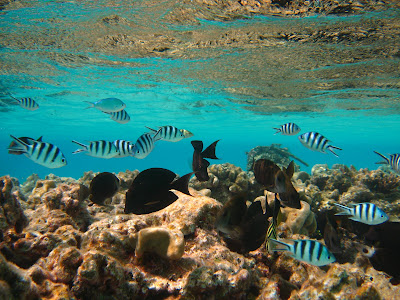 We've spent the past few days snorkeling the reef and lagoon around Assam's pearl farm.
We've spent the past few days snorkeling the reef and lagoon around Assam's pearl farm.

 Sten has been practicing with his spear gun. Today he speared a grouper for our lunch. Then, late this afternoon he headed out with Tony and Ocean to fish for dinner. He speared one medium fish, but the big grouper got away - his spear was dull and it didn't penetrate far enough to hold onto the fish. These past few days Sten has made two more attempts to fish the outside reef, but both were foiled by heavy seas. Thankfully, there is always pasta. Meanwhile I've been hunting for shells. I found a big speckled cowrie that proved to be the exception to our rule about not taking occupied shells. Extracting the occupant was a gross, stinky, slimy operation that reinforced the rule.
Sten has been practicing with his spear gun. Today he speared a grouper for our lunch. Then, late this afternoon he headed out with Tony and Ocean to fish for dinner. He speared one medium fish, but the big grouper got away - his spear was dull and it didn't penetrate far enough to hold onto the fish. These past few days Sten has made two more attempts to fish the outside reef, but both were foiled by heavy seas. Thankfully, there is always pasta. Meanwhile I've been hunting for shells. I found a big speckled cowrie that proved to be the exception to our rule about not taking occupied shells. Extracting the occupant was a gross, stinky, slimy operation that reinforced the rule.It has been ages since we have had fresh vegetables. I was able to pick up two zucchini (so woody that my mom would have plucked them from the garden and immediately chucked them onto the compost pile) in Nuka Hiva, but that was it. The other night I commented to MeMei that I dream about salads. The next day the supply ship that provisions the atoll and picks up copra produced here arrived. Town was too far away for us to get there by dinghy, but MeMei remembered my comment and brought us some lettuce, tomatoes and carrots. That salad tasted so good.
The other morning, on their way out to pick up some oysters from the lagoon, Alfred, Tony and Ocean stopped by to see if we wanted to come with them. Strung between buoys on the surface of the lagoon are ropes, about 15 feet down, from which hang bundles of oysters, protected from predators by heavy plastic netting - much like snow fencing. We dove in and watched as Tony untied each conical net and swam it to the surface, where one of their employees pulled it aboard. After gathering 20 or so, they returned to the dock.
First the lines of oysters were removed from the protective nets. Then two of the employees scrapped the growth off of the outside of the shells, while Tony opened the oysters just enough to jam a rubber wedge between the shells. Inside the dock house, Alfred and Ocean used a series of tools (similar to dental tools) to tease the mantle away from the inside of the shell and (hopefully) extract the pearl.The pearls they were extracting this day were the first from these oysters. Quite a few of the oysters didn't produce a pearl at all, so they were chucked into the to-be-eaten pile. Those shells that produced a pearl received a new round nucleus (made from the shell of a Mississippi river mussel) the same size as the pearl that was extracted. Alfred has been grafting pearls for 17 years. His motions as he extracted and grafted were incredibly efficient. Once a new nucleus has been grafted into the oyster, it is hung in a small net under the dock for a time before being placed back out into the lagoon.

We joined Alfred for a dinner of BBQ chicken (shipped from California). During dinner we talked (Beatrice and Antoine patiently translated my questions and the key points of Alfred's responses) about religion, the environment and the nuclear testing that used to take place in the atolls. The family are members of the Reformed Church of Jesus Christ of Latter Day Saints. Alfred was very clear that their church, headquartered in Missouri, was not the same as the Mormon church, headquartered in Salt Lake City. I knew that the Book of Mormon suggests that the Polynesians were descendants of migrants from South America and I wanted to know what Alfred thought. He agreed that due to the currents and predominant wind patterns that Polynesians must have come from South America. Alfred also noted that the Polynesian tiki culture is similar to the idol worship practiced by South, Central and North American Indians. Most anthropologists and archeologists believe that Polynesians, Micronesians and Melanesians descended from Asian migrants. Alfred pointed out that Polynesians are much taller than Asians. I suggested that the height difference was a result of generations of diets rich in protein.
Tuamotans, living on atolls only a few feet above sea level, are concerned about rising sea levels. Bush's refusal to sign the Kyoto Protocol is an unpopular decision here. After we Americans had our moment of discomfort, it was the French's turn, as the conversation shifted to France's history of nuclear testing in the atolls and the recent sale of nuclear power to Libya. As far removed as Apataki seems to be from the rest of the world, the people here are tuned into world events.






No comments:
Post a Comment